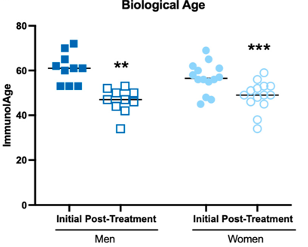Probiotics Reverse Aging When Combined with Vitamin D, New Research Shows
A pilot study shows that probiotics — beneficial gut bacteria — combined with vitamin D reverses biological age by over 10 years and improves the immune system of both men and women.
Highlights:
- Three probiotic strains combined with vitamin D reduce the biological age of men and women by an average of 11 years.
- The probiotic and vitamin D combo also improves immune system function and deters two important biological drivers of aging.
The composition of our gut bacteria plays a major role in how we age and how our immune system behaves. It follows that introducing beneficial gut bacteria — probiotics — to our digestive tract can improve our immune system and even slow down the aging of our body.
As recently published in Biomolecules, Spanish scientists found that combining vitamin D, which plays a vital role in immune function, with a blend of three probiotic strains reverses biological age by over 10 years and improves immune function. These findings suggest that probiotics combined with vitamin D can potentially reverse aging by rejuvenating our immune system.
Probiotics and Vitamin D Reverse Biological Aging
Our biological age can be thought of as the age of our cells, organs, and body. It is different than our chronological age — the number of years we have been alive. While some individuals have a biological age that is lower than their chronological age, others can have a biological age that is higher than their chronological age, suggesting they are aging rapidly.
To determine the biological age of the participants, the Spanish researchers utilized several biological measurements, including those assessing immune system health. For instance, the researchers measured the activity of natural killer cells — white blood cells that help fight off diseases. They found that natural killer cell activity was higher in participants who took probiotics combined with vitamin D.
Using measurements like natural killer cell activity, the researchers determined the biological age of each participant before and after taking the probiotic and vitamin D combo. The combo, which consisted of three strains of probiotics (Bifidobacterium animalis, Lactobacillus reuteri, and Lactobacillus plantarum) and 40 IU of vitamin D, was taken every day for 2 months.
The results showed that, on average, after taking the probiotic and vitamin D combo, the biological age of the participants was reduced by eleven years. Notably, before taking the probiotic and vitamin D combo, the participants already had a biological age (~58 years) that was higher than their chronological age (~48 years).

In addition to immune system function, the researchers assessed two major underlying drivers of cellular aging: inflammation and oxidative stress. Overall, their results showed that the probiotic and vitamin D combo reduced inflammation and oxidative stress. These findings suggest that enhancing the immune system with probiotics and vitamin D may slow down aging by reducing inflammation and oxidative stress.
Study Limitations
The study’s limitations are rooted in the limitations of a pilot study in general, the most obvious of which is the number of participants. The study included 10 men and 14 women between the ages of 30 and 60. In general, a small sample size like this can lead to statistical errors that can otherwise be avoided with more participants. Interestingly, the error bars are not shown in any of the graphs in this publication.
Furthermore, there may be differences in how the probiotic and vitamin D combo affects different age groups. For example, the combo could have more of an effect on 60-year-olds than 30-year-olds. However, this sort of information cannot be resolved with such a small sample size. Larger studies with narrower age ranges may help to determine which age is best to begin taking probiotics and vitamin D to reverse biological age.
Another limitation is the lack of a control group. Without a placebo group, it is difficult to determine whether the probiotics and vitamin D played a causal role in reversing biological age and improving immune function. For example, it is possible that while participating in the study, the men and women taking the probiotics and vitamin D ate healthier foods, which could potentially improve immune function and reduce biological age. A placebo group would control for such unforeseen variables.
Overall, the study supports the idea that maintaining a healthy gut microbiome can lead to better health. Whether vitamin D is necessary will require further study. Moreover, while probiotics may promote a healthier gut microbiome, a diet high in fiber does so as well. Foods high in fiber include whole grains, fruits, vegetables, legumes, seeds, and nuts.

